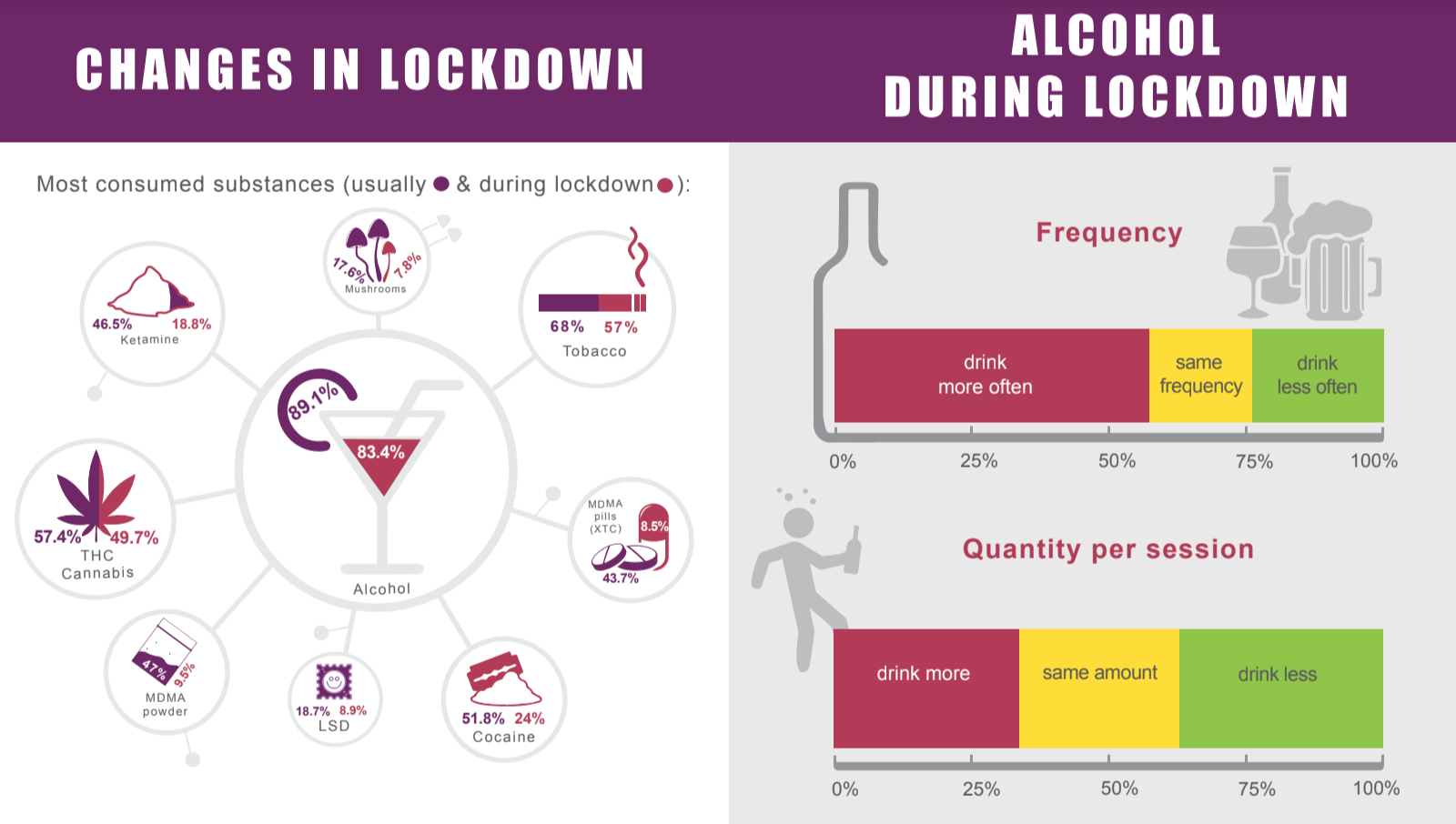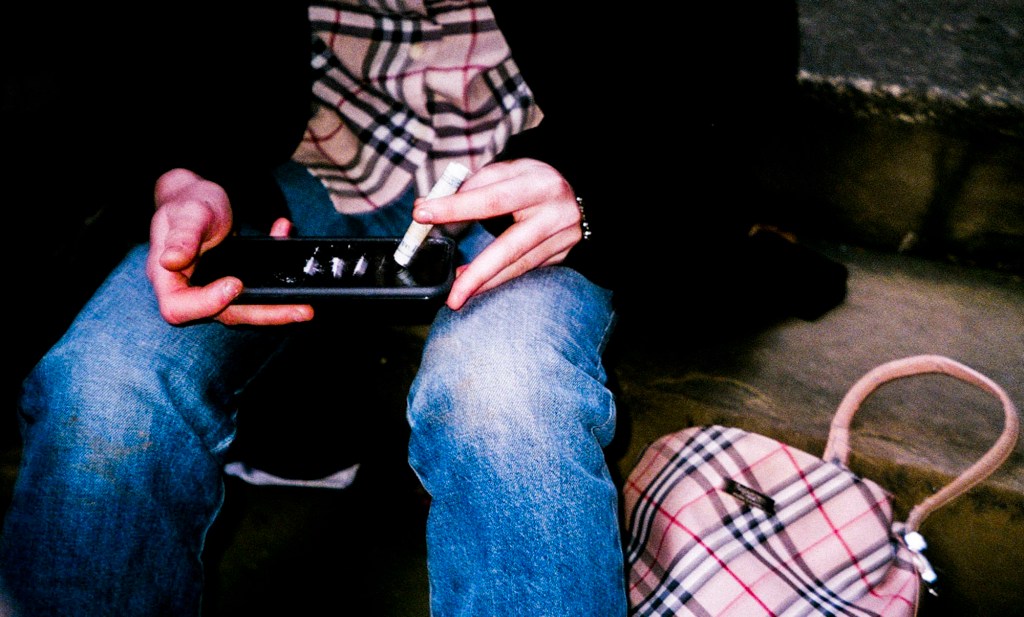Lockdown has been a strange time to take drugs. As society grappled with the threat of coronavirus, something felt inherently wrong about spending your furlough money on a bag of cocaine to ingest with three other impossibly sad men on the other end of a Zoom call.
As someone who did this just once during those sombre days of spring, I can confirm it was an Objectively Bad Idea. But with the spectre of open pubs and legal house visits now upon us – not to mention the nation’s current penchant for illegal raves – the scene is set for Brits to rekindle their love of the sesh.
Videos by VICE
Harm reduction and drugs testing charity The Loop just released its Trans-European Covid-19 survey, with results broadly echoing those of the Global Drug Survey and EMCDDA: alcohol use increased during lockdown, while the use of “party drugs” like cocaine, MDMA and ketamine decreased without pubs, clubs and smoky kitchens for us to congregate in.
I spoke to Fiona Measham from The Loop, as well as addiction charity We Are With You (WAWY), about how to indulge safely post-lockdown and, ideally, not be a dick in the process.

WATCH YOUR TOLERANCE
Of the 47 percent of respondents to The Loop’s survey who normally take MDMA, just 9.5 percent reported using in the lockdown period until the 1st of June. 51.8 percent of cocaine users decreased to 24 percent, and 46.5 percent taking ketamine reduced to 18.8 percent. While it’s clearly positive that people put down their straws, these reductions provoke concerns around tolerance, as a nation of casual drug users emerge from stasis into the bullring of a state-sponsored “Super Saturday” tear-up.
“A break from using drugs would definitely lead to someone having a lower tolerance,” says Dr Rachel Britton, Director of Pharmacy at WAWY. “Start by taking an amount that would be smaller than your usual dose.” In practical terms: don’t let your mate who picked up every weekend during lockdown tempt you back with with huge “honey, I’m home” slugs of gak or ketamine. This advice is particularly relevant if you’re heading to an illegal rave or outdoor party.
“There aren’t paramedics or first aid,” warns Fiona Measham, founder of The Loop. “If you wander off in a forest or a field feeling worse for wear, we know that the people who get a delay in medical help are ones that can die.” One 18-year-old died of a suspected drug overdose at Oldham’s Daisy Nook rave, and headlines around young people passing away after taking large doses of high strength MDMA and ecstasy are maddeningly familiar.
“If users are having a bad time or get separated, that will be a real worry at these events,” says Measham. The Loop’s standard advice? Start with a quarter and regularly sip water.
YOU DON’T *HAVE* TO GET INVOLVED
Your WhatsApp group might be popping off with the hedonistic possibilities of Super Saturday, but the nation’s collective brain matter is in a perilous state. A recent Mind study found that, of those with a pre-existing mental health condition, 75 percent of people aged 13 to 24 years old, and 65 percent of over-25s, reported it getting worse. A report by Nuffield Health found that 80 percent of remote workers said working from home had worsened their mental health. With this in mind: set, setting and staying in your comfort zone are more important than ever.
“You’ll have people that are really comfortable going out again. Being in a busy pub, surrounded by people at an outdoor party, maybe taking drugs or drinking lots in these environments,” says Fiona Measham. “But many people won’t – it might be because of pre-existing mental health conditions or because they’ve become socially anxious through being inside for months.”
Ease your way into things. Don’t feel like you have to traipse to the pub or drop a half if the mood isn’t right for you. Similarly, Britain might have been home to Europe’s two capital cities of cocaine pre-lockdown, but if you’re feeling pleased that you’ve managed to kick your casual cocaine habit, don’t feel pressured into immediately meeting with the Big Thursday crew that normally trigger you into putting in a call after two pints .
“Cocaine use is about people, places and things,” Dr Adam Winstock of the Global Drug Survey told VICE in January. “If people want to cut down or stop using drugs, it’s best to avoid people or situations where they would usually find themselves doing those things,” says Dr Rachel Britton.

RESPONSIBLE SESH
While our social life support machine is slowly flickering after flat-lining for months, there’s plenty of evidence to suggest that coronavirus loves a sesh. Bars were thriving in Arizone during June, and this week the state went back into lockdown, while 100 new cases in Seoul were traced to one 29-year-old man visiting five bars and clubs across one night. If you aren’t moved by the health implications that might ensue from ignoring social distancing guidelines, Fiona Measham suggests thinking about the economical repercussions.
“Some people might not care about catching the disease – maybe they don’t have older relatives who can get infected. But we’ve got a recession incoming, and many business that clung on will go under if they go back into lockdown. Young people are going to be hit worse, and it’s their future.”
We’ve also seen a scourge of littering after parties and raves in the UK, with tabloids gleefully posting headlines about “hippy crack”. “People seem to have lost their heads in their UK [regarding litter],” says Measham. “A greater sense of collective responsibility is needed.”
In terms of practicalities for those using shareable substances, Dr Rachel Britton says “coronavirus can be spread by sharing e-cigarettes, pipes, bongs or joints, or nasal tubes, such as straws. If you have to share, wipe down the mouthpieces with an alcohol swab before sharing, or use separate mouthpieces.”
If you’re a smoker, bring everything you need – rolling tobacco, papers, filters, lighter – with you so you’re not sharing. Hand sanitiser: clearly. And one final personal thing from the point of view of your lowly writer whose girlfriend manages a public house: these most totemic of British institutions are opening their doors for the first time in over three months, with likely anxious staff trying to incorporate strange new operating procedures designed to stop people dying. Be endlessly pleasant to those pouring your booze, tip like an American, and if things aren’t working as smoothly as you like – don’t be a dick about it.
More
From VICE
-

All photographs by Adam Rouhana -

(Photo by rez-art / Getty Images) -

Budrul Chukrut/SOPA Images/LightRocket/Getty Images -

RapidEye/Getty Images
